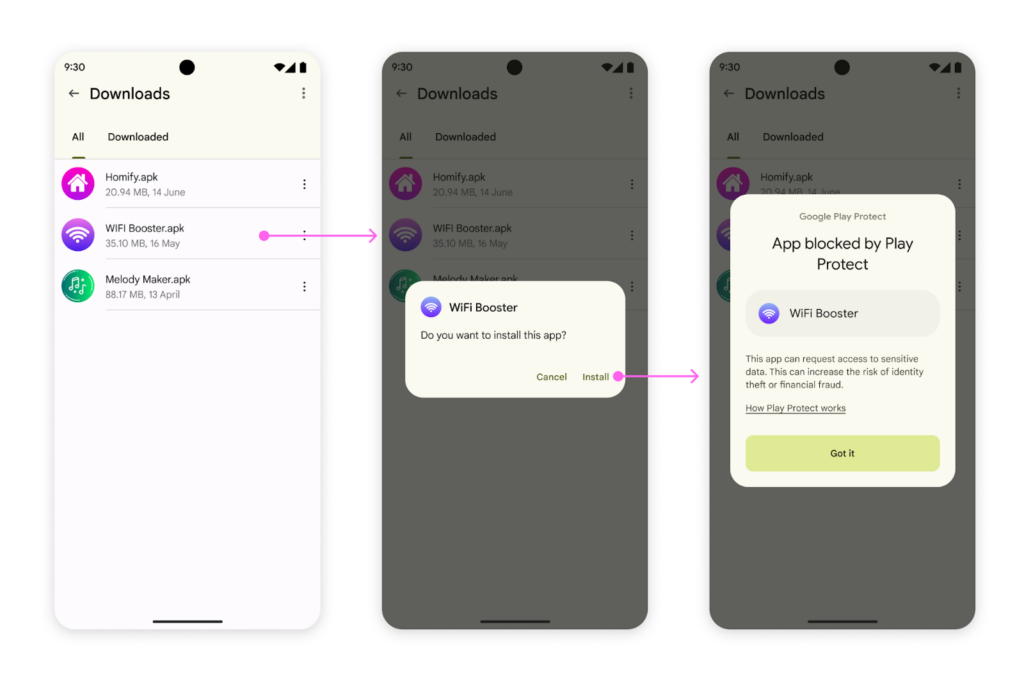
Google’s commitment to security bolstered by partnership with the CSA. (Source – Shutterstock).
Google and the Cyber Security Agency of Singapore forge a strategic alliance
- Google Singapore and the Cyber Security Agency of Singapore launch a security feature in Google Play Protect to block harmful apps, enhancing mobile security.
- Despite high scam awareness, half of Singaporeans fall victim; Google’s new feature aims to improve safety.
- Google and the CSA’s partnership advances Singapore’s digital security through innovative features and education.
The battle against cyberthreats is becoming increasingly complex and demanding. Recognizing the imperative need for advanced security solutions, key industry players and regulatory bodies are stepping up their game to shield consumers from the ever-evolving landscape of cyber-risks. At the heart of this crucial endeavor is the synergy between technology giants and government agencies, a partnership that not only aims to protect but also to pioneer in the realm of digital safety.
This narrative unfolds as Google Singapore and the Cyber Security Agency of Singapore (CSA) embark on a groundbreaking initiative, setting a new benchmark in mobile security measures. Their collaborative effort marks a significant leap forward, underscoring the importance of unified strategies in combating cyber scams and malware, thereby ensuring a safer digital environment for all.
Strategic collaboration between Google and the Cyber Security Agency of Singapore
As the digital frontier expands, this collaboration between Google and the CSA becomes critical in safeguarding mobile users from the burgeoning threat of cyber-scams. Singapore is set to be the first country to pilot this advanced feature on Android devices in the coming weeks. Having undergone rigorous pre-testing, this initiative is a testament to the robust partnership between Google and CSA, emphasizing their commitment to fortifying cybersecurity and anti-scam measures, officially announced in October 2023.
In today’s digital age, mobile devices are the cornerstone for numerous digital and financial transactions, leaving users globally vulnerable to financial fraud. Cybercriminals often employ social engineering tactics to deceive users into compromising their security safeguards and disregarding proactive malware, scam, and phishing warnings.
These deceptions, often disguised as financial incentives, savings, or urgent issues needing resolution, can lead users to inadvertently download malicious applications from various online sources, including web browsers, messaging apps, or file managers. This practice, known as internet sideloading, poses a significant risk as it can lead to the disclosure of sensitive personal information or the unwitting transfer of funds to fraudsters.
A recent Google Singapore 2024 Scams survey revealed that, despite Singaporeans’ confidence in their ability to identify and evade scams, 1 in 2 online users still succumb to them.
To counter these threats, Android has embedded multiple layers of protection to shield users from various security threats, including fraud, scams, and phishing. These protective measures include Spam Protection in Messages, Safe Browsing in Chrome, and the cornerstone of mobile security, Google Play Protect.
Real-time scanning: A key to advanced security
A notable enhancement to Google Play Protect is the introduction of real-time scanning, designed to fortify defenses against newly emerging malicious, sideloaded applications. These applications employ sophisticated methods, including artificial intelligence, to evade detection by altering identifiable features. Since its implementation, real-time scanning has identified over 515,000 new potentially harmful apps, issuing over 3.1 million warnings or blocks to protect users from potential harm.
The new enhanced protection feature on Android is geared towards providing Singaporean users unprecedented security. It operates by automatically blocking the installation of apps from internet-sideloading sources that request sensitive runtime permissions frequently exploited for financial fraud.
By scrutinizing the permissions requested by an app in real-time, focusing on permissions such as reading and receiving SMS messages, accessibility services, and notification listening services, Google Play Protect identifies and mitigates potential threats.
Google’s threat analysis reveals that a vast majority of malicious app installations, over 95 percent, originate from internet-sideloading sources, underscoring the critical need for this enhanced protection.
Scheduled to begin in coming weeks, the pilot of this enhanced protection feature will progressively roll out to users in Singapore. Users attempting to sideload apps that intend to use sensitive permissions will encounter a blocking prompt from Google Play Protect, accompanied by an explanatory message detailing the reasons behind the app’s blockage.

Google Play Protect Block prompt. (Source – Google).
Chua Kuan Seah, the CSA’s Deputy Chief Executive, emphasizes the importance of continuous innovation and collaboration in effectively combating online scams. This cooperation with tech leaders such as Google is crucial in bolstering Singapore’s defenses against scams and safeguarding citizens’ online safety and digital assets.
Eugene Liderman, director of Android security strategy at Google, highlights the company’s commitment to a secure Android experience. The partnership with the CSA and the Singapore government is critical to protecting users from financial fraud. This pilot in Singapore is part of broader efforts to enhance user safety, with ongoing evaluations for future refinements. Collaboration with industry partners and focusing on user education are essential in addressing the changing landscape of cyberthreats.
Singapore’s Android users are encouraged to familiarize themselves with the new enhanced protection feature, becoming more informed and vigilant. Alongside this feature’s launch, Google continues to support the CSA with malware detection, sharing insights, and creating educational materials for users and developers. This includes working with industry partners and government agencies to increase user education and awareness.
Looking ahead: the future of cybersecurity in Singapore
Following the introduction of this innovative security feature, Andy Ng, vice-president and managing director for the Asia South and Pacific region at Veritas Technologies, offers a broader perspective on the importance of fostering trust in digital systems through robust cybersecurity measures and public education.
He emphasizes that the Singapore Budget 2024 must prioritize initiatives supporting the adoption of emerging technologies like AI and ensuring investments in comprehensive cybersecurity infrastructure, regulatory frameworks, and educational campaigns. These efforts are vital for building and maintaining trust among citizens, businesses, and investors, enhancing transparency, accountability, and the ethical use of data.
Ng’s commentary underscores the need for organizations to adopt a 360-degree defense architecture to bolster their cybersecurity posture, ensuring that data and applications remain safe and resilient across all environments. This approach necessitates significant financial backing to develop a practical defense framework through the judicious application of technology.
He also highlights the importance of collaborative efforts between the government, private sector, and academia in addressing emerging threats and preserving the integrity of Singapore’s digital ecosystem. The Cybersecurity Talent, Innovation and Growth (Cyber TIG) Plan, which earmarks S$50 million over the next three years, is cited as a timely and strategic investment to strengthen the cybersecurity ecosystem, enhancing the region’s economic opportunities.
Moreover, Ng stresses the critical role of promoting digital literacy and empowering individuals with the skills to safely navigate the digital landscape. Educational and public awareness campaigns are vital to helping citizens recognize and mitigate online risks, thereby cultivating a culture of responsible digital citizenship.

Android sideloaded malware layered security UI. (Source – Google).
This emphasis on education and awareness is echoed in Google’s initiatives, such as the YouTube Creators for Impact program, which partners with local governments to leverage content created by The Smart Local and Sethisfy Personal Finance, among others, to raise awareness about digital safety topics. Google’s dedication to digital literacy extends to protecting vulnerable populations through collaborations with nonprofit organizations like RSVP Singapore and the Singapore Police Force on projects like Project PRAISE, aimed at educating seniors on scam prevention.
Additionally, Google organizes forums with financial services companies to share insights on combating scams and discuss tools that can help prevent malicious mobile security attacks, demonstrating a comprehensive approach to enhancing digital security and literacy across the community.
By prioritizing security, privacy, and user empowerment, Google and its partners are laying the groundwork for a digital environment where innovation and safety coexist, ensuring the online wellbeing of Singaporeans and fostering a resilient digital future.
READ MORE
- Data Strategies That Dictate Legacy Overhaul Methods for Established Banks
- Securing Data: A Guide to Navigating Australian Privacy Regulations
- Ethical Threads: Transforming Fashion with Trust and Transparency
- Top 5 Drivers Shaping IT Budgets This Financial Year
- Beyond Connectivity: How Wireless Site Surveys Enhance Tomorrow’s Business Network




